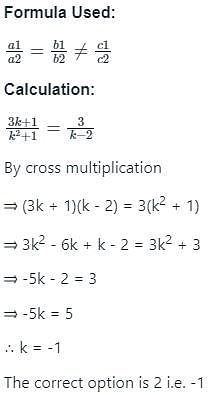Test: Systems of Linear Equations, Matrix Algebra & Transform Theory- 2 - Engineering Mathematics MCQ
30 Questions MCQ Test Linear Algebra - Test: Systems of Linear Equations, Matrix Algebra & Transform Theory- 2
Consider the system of equations given below:
x + y = 2
2x + 2y = 5
This system has
x + y = 2
2x + 2y = 5
This system has
For what value of a, if any, will the following system of equations in x, y and z have a solution?
2x + 3y = 4
x+y+z = 4
x + 2y - z = a
2x + 3y = 4
x+y+z = 4
x + 2y - z = a
Solution for the system defined by the set of equations
4y + 3z = 8;
2x – z = 2
and 3x + 2y =5 is
4y + 3z = 8;
2x – z = 2
and 3x + 2y =5 is
For what values of α and β the following simultaneous equations have an infinite numberof solutions?
x + y + z = 5; x + 3y + 3z = 9; x + 2y + αz = β
Let A be a 3 × 3 matrix with rank 2. Then AX = 0 has
A is a 3 x 4 real matrix and A x = b is an inconsistent system of equations. The highest possible rank of A is
Consider the matrices X (4 × 3), Y (4 × 3) and P (2 × 3). The order or P (XTY)–1PT] T will be
Given matrix [A] = the rank of the matrix is
The Laplace transform of
For what value of k, the system linear equation has no solution
(3k + 1)x + 3y - 2 = 0
(k2 + 1)x + (k - 2)y - 5 = 0
If L defines the Laplace Transform of a function, L [sin (at)] will be equal to
The Inverse Laplace transform of is
Laplace transform for the function f(x) = cosh (ax) is
If F(s) is the Laplace transform of function f (t), then Laplace transform of
Laplace transform of the function sin ωt
Laplace transform of (a + bt)2 where ‘a’ and ‘b’ are constants is given by:
A delayed unit step function is defined as Its Laplace transform is
The Laplace transform of the function sin2 2t is
Find the rank of the matrix
The running integrator, given by
The state transition matrix for the system X- = AX with initial state X(0) is
The Fourier transform of x(t) = e–at u(–t), where u(t) is the unit step function
The fundamental period of the discrete-time signal is
u(t) represents the unit step function. The Laplace transform of u(t – ζ) is
The fundamental period of x(t) = 2 sin πt + 3 sin 3πt, with t expressed in seconds, is
If the Fourier transform of x[n] is X(ejω), then the Fourier transform of (–1)n x[n] is
Given f(t) and g(t) as shown below:
g (t) can be expressed as
Given f(t) and g(t) as shown below:
The Laplace transform of g(t) is
The Laplace transform of g(t) is
Let Y(s) be the Laplace transformation of the function y (t), then final value of the function is
|
7 docs|7 tests
|






















